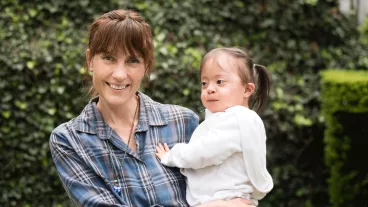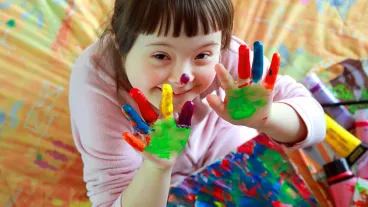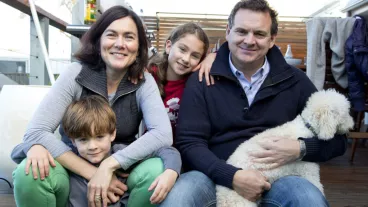Support needs of siblings of children with disability
You are in an archived section of the AIFS website
April 2019
Kate Strohm
A recent mapping project has highlighted the significant challenges and longer term health impacts that siblings of people with disability1 may experience during their childhood and into adulthood. Conducted by Siblings Australia, with support from the National Disability Insurance Scheme, this project focused on younger people and revealed some key gaps in support services for siblings of children and young people with disability.
In 2015, there were an estimated 255,000 children and young people (0–25 years) with severe or profound disability2 in Australia (Australian Bureau of Statistics, 2016). While there is no clear data available, it may be assumed that many of these children and young people have a sibling (or siblings) without disability.
Many siblings of children and young people with disability enjoy fulfilling relationships with their brothers and sisters. However, young siblings can also experience significant stress, both within and outside the family. Research indicates these stressful experiences often lead to longer term mental and physical health problems (Hogan, Park & Goldscheider, 2003; Lamorey, 1999).
The Siblings Australia mapping project suggests that young siblings would benefit from a more targeted approach to respond to their needs during childhood and adolescence to support them as they are growing up and help prevent negative impacts later in life.
Experiences and needs of siblings of children and young people with disability
As part of the mapping project, parents (n=198), adult siblings aged 18 years and older (n=106) and service providers (n=48) from a range of sectors (e.g. disability, health and education) were surveyed about the needs and experiences of siblings of children and young people with disability.
The survey results revealed:
- 84% of adult siblings reported family stress was an issue during their childhood
- 73% of parents identified family stress as an issue for young siblings.
Many siblings reported physical and/or mental health problems experienced in childhood that they believed were a result of stresses associated with family relationships:
- 66% of adult siblings reported anxiety during childhood
- 54% of adult siblings reported depression during childhood
- 59% of parents identified anxiety among their children without disability.
Results from the survey also highlighted that the needs of siblings change over time. This includes the support siblings need to manage their own challenges, but also the support to assist a brother or sister as they get older.
In addition to the mapping project, the work of Siblings Australia has shown that the issues that siblings experience can be complex and difficult for others to recognise or understand. Given their experiences and confusion of feelings such as grief and guilt, it can be difficult for siblings to advocate for themselves.
At the same time, parents may often be too stretched emotionally and practically to recognise the needs of their children who live without disability. For those who do recognise the needs, the search for appropriate support services can be both difficult and frustrating. Some parents reported that watching the impact on siblings and being unable to find specific support for them added to their own stress.
Several parents and siblings involved in the mapping project acknowledged the importance of this issue to their families. As one parent wrote:
Thank you for investing time and effort, and promoting an aspect of disability care that is incredibly overlooked and taken for granted. The stresses on siblings are huge and, if anything, I feel they only increase as they get older.
Gaps in support services for siblings
The mapping project showed that only a handful of sibling-specific services were available across Australia. It also revealed that very few of the siblings surveyed had accessed support either as children or as adults. Among those who reported accessing some support, only a small number believed it had fully met their needs.
While some carer support services are inclusive of siblings, the roles of sibling and carer should not be conflated. Not all siblings perform carer roles and, even if they do, support services for carers are not always appropriate for siblings.
Parents, service providers and adult siblings who participated in the survey all highlighted not only the gaps in services, but also the gaps in the skills and knowledge of providers who come into contact with families from a range of sectors. Adding to the complexity of support needs for siblings is the lack of clear policies that directly relate to siblings within relevant sectors, including disability, health, education, and child and family welfare.
What is needed?
In light of the needs of siblings of children and young people with disability, and the lack of appropriate support services available to them, the mapping project report highlighted a range of improvements in policy, support services and workforce development initiatives needed to address these issues. Among its key recommendations, the mapping project report called for:
- Strengthening of national policies to ensure that the needs of siblings are acknowledged and provided for from an early age
- Improving support services (e.g. information, peer support and counselling) across the lifespan to ensure the health and wellbeing of siblings, and to strengthen family relationships
- Building workforce development across a range of sectors to improve practices that aim to support siblings
- Investing in research and evaluation projects to build the evidence base for effective policies and practices.
References
Australian Bureau of Statistics. (2016). Disability, Ageing and Carers, Australia: First Results, 2015. Canberra: ABS. Retrieved from www.abs.gov.au/AUSSTATS/[email protected]/DetailsPage/4430.0.10.0012015?OpenDocument
Hogan, D. P., Park, J. M., & Goldscheider, F. K. (2003). The health consequences of a disabled sibling for school-age children. In B. Altman, S. Barnartt, G. Hendershot, & S. Larson (Eds.), Using Survey Data to Study Disability: Results from the National Health Survey on Disability (Research in Social Science and Disability Vol 3, pp. 185–205). Bingley, UK: Emerald Group Publishing.
Lamorey, S. (1999). Parentification of siblings of children with disability or chronic disease. In N. D. Chase (Ed.), Burdened children: Theory, research and treatment of parentification. Thousand Oaks, CA: Sage Publications.
1 In this short article, ‘siblings’ refers to siblings without disability.
2 Severe or profound disability refers to severe and profound core activity limitation. See the Australian Bureau of Statistics website for information about how severe and profound core activity limitation is defined: www.abs.gov.au/AUSSTATS/[email protected]/Latestproducts/4430.0.10.001Glossary602015?opendocument&tabname=Notes&prodno=4430.0.10.001&issue=2015&num=&view=
© GettyImages/SolStock
Related publications

Paying attention to the mental health of parents of…
This short article explores opportunities to build workforce capacity to better support the mental health of parents of…
Read more
Children with disability: Inclusive practice and child-safe…
This webinar focused on developing practical strategies to create safe and inclusive environments for children with…
Read more
Placing family at the centre of mental health recovery
This webinar outlined ways in which practitioners can support healing and recovery in families affected by parental…
Read more